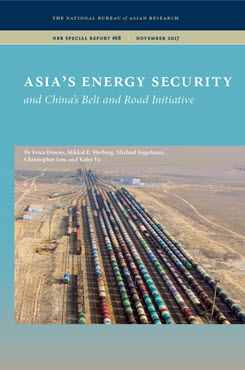China's Maritime Silk Road and Energy Geopolitics in the Indian Ocean
Motivations and Implications for the Region
This essay examines how the 21st Century Maritime Silk Road under China’s Belt and Road Initiative (BRI) relates to Beijing’s quest for energy security and draws implications for Japan, India, South Korea, and the U.S.
EXECUTIVE SUMMARY
This essay examines how the 21st Century Maritime Silk Road under China’s Belt and Road Initiative (BRI) relates to Beijing’s quest for energy security and draws implications for Japan, India, South Korea, and the U.S.
MAIN ARGUMENT
A common theme for the four major Asian economies of China, Japan, India, and South Korea is their heavy reliance on maritime transport for access to natural resources, which is expected to grow in the future. China, with its traditional emphasis on self-reliance, has sought to diversify its energy import sources and transit routes and protect its own rights and interests overseas. From the perspective of energy security, China’s development of access to port facilities for the People’s Liberation Army (PLA) Navy and alternative overland transit pipelines through its littoral neighbors will be the defining features of the Maritime Silk Road. However, Chinese actions have raised concerns among U.S. and Asian stakeholders about the future balance of power in the region and the development of a Sinocentric order.
POLICY IMPLICATIONS
- China’s traditional emphasis on self-reliance provided the imperative for its energy diversification strategy and the development of the PLA Navy’s blue water capabilities. These activities are in turn driving new cooperative and competitive dynamics in the Indian Ocean region.
- China’s narratives about the benefits of BRI and the protection of rights and interests overseas are increasingly converging into a single broader narrative about China’s preparedness to contribute to common security in the areas covered by BRI. A likely result of this converged narrative is the increase in diplomatic activities by the PLA Navy under the auspices of BRI.
- The PLA Navy requires access to friendly ports across the Indian Ocean, and China is also looking for alternative overland transit routes to connect its overseas oil and gas shipments. Achieving these goals will require China to co-opt smaller littoral states into the Maritime Silk Road agenda.
- If the U.S., India, and Japan can forge a substantive strategic partnership, their accommodation of China as a rising maritime power will be less likely. Paradoxically, efforts to counterbalance or impede China’s plans will further ingrain the country’s sense of energy insecurity and reinforce its determination to enhance its maritime capabilities and develop alternative transit routes for its energy imports.
Christopher Len is a Senior Research Fellow in the Energy Studies Institute at the National University of Singapore.


